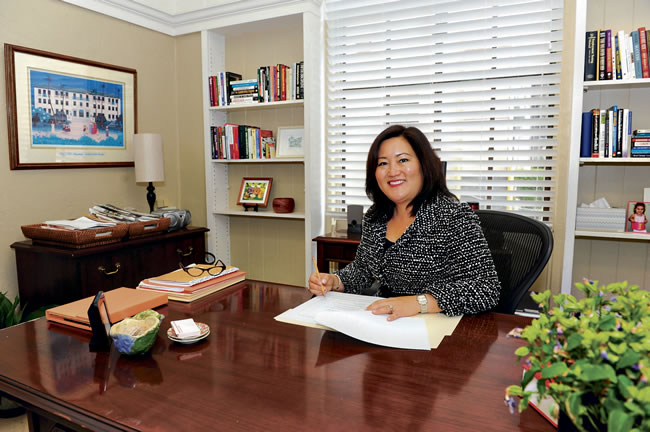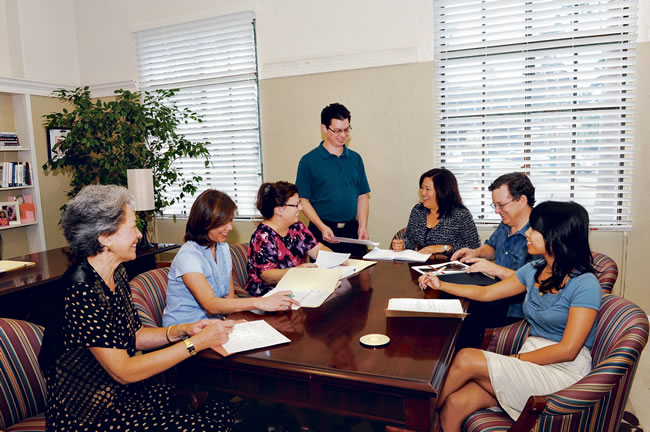New Leader, Energy At The YWCA
The new CEO of the YWCA of Oahu wants to make it an ‘organization that is leading a women’s movement and making a difference’
In the late 1990s, local girl Kimberly Miyazawa Frank was working as a development officer at Miami University, her undergraduate alma mater, in Oxford, Ohio. At one potential-donor reception, Frank was chatting with an older woman when suddenly, the woman asked her a question that she often got living in the Midwest.
“What are you?” the woman asked.
Frank was a lot of things. Only in her early 30s at the time, she was a lawyer turned fundraising officer and a volunteer at various community organizations. But the woman wasn’t interested in any of that. No, the woman attempted to explain, she wanted to know what Frank was – like how she could trace her ancestors back to when they arrived on the Mayflower. Frank explained that she was Japanese-American.
Kehaulani Coleman, Dolly Wong, Charmaine Damon, Ian Hideo Murphy, Kimberly Miyazawa Frank, Jay McMinors and Carmille Lim
The woman seemed astounded, and her response was one that Frank will never forget: “Wow, you’re so smart and articulate. And you don’t even have slanted eyes.”
Frank was confused and unsure of how to respond. But she wasn’t all that shocked. After spending much of her adult life living and working in places that were predominantly white, Frank had become familiar with these types of inquiries. And earlier in her career, as a lawyer at a Cincinnati law firm, Frank often was the only woman in many professional settings.
Today, as the newly appointed CEO of the YWCA of Oahu, Frank is working to expand the organization’s programs and increase its advocacy efforts. The mission of the YWCA is “eliminating racism, empowering women.” After years of experiencing firsthand the effects of both gender and racial discrimination, Frank is striving to address such injustices and work toward equality for women and people of color. “I really see the YWCA as not a building or just a provider of services, but really as an organization that is leading a women’s movement and making a difference in our community,” Frank says.
Established in 1900 and currently comprised of about 3,000 members, the YWCA of Oahu is the oldest and largest women’s organization in the state. It consists of three facilities: Laniakea in town, Fernhurst in Makiki and Kokokahi in Kaneohe. It is one of nearly 300 affiliates of the national organization. Worldwide, YWCA has more than 25 million members in 122 countries. Locally, it was originally designed to be a place where women could find encouragement and support, take classes or simply relax. Throughout the years, YWCA has been steadily expanding its services and programs to meet emerging issues women face.
Today, it offers programs that focus on job training, economic self-sufficiency and physical well-being. In addition, YWCA provides something for women in the larger scope of things – an entity that fights for social justice. Under Frank’s leadership, it aims to increase its impact in this wider realm. It seems the YWCA is standing on the cusp of what could be a new era.
“I see this as a time when we are positioned to be able to make an even bigger impact in our community by addressing some of these more contemporary issues, for marginalized populations, as well as for our career-based women,” says Frank, who is married and has three young children.
Existing programs include Dress for Success, which provides donated business attire for women who are looking for work – along with individualized sessions that cover other aspects that could help them land a job, including interviewing skills and resume-writing tips.
Another program that helps women achieve economic self-sufficiency is Homebase, which provides temporary housing for women in transition – including those coming out of a domestic violence situation or incarceration – at the Fernhurst facility.
YWCA also offers a range of health and wellness courses, including swimming, tai chi and Zumba, as well as leadership-development classes designed for women in the workplace.
One of the key things that Frank is hoping to do is expand the organization’s advocacy work. When she started as CEO in January, working with various policy issues in the 2012 legislative session was one of the first things on her agenda.
“Advocacy helps us to increase our impact beyond the walls of the organization,” Frank says.
YWCA addresses various policy areas, including economic empowerment, health and safety, and racial justice and civil rights through educational programs and research. The organization also supports and submits testimony for bills or resolutions that go before the Legislature. In the current session, YWCA is working with policies that deal with disparate impact of women when it comes to issues such as workplace inequality and threats to healthcare.
“Unfortunately, a lot of these issues are not new issues,” Frank says. “They are issues that historically have been around, but they still persist.”
The organization also is working to add new programs. Frank envisions one program that will address the needs of working women at various stages in their careers – from the entry-level worker to upper-level management – and all of the transitions in between. YWCA hopes to extend that outreach to younger girls by initiating a new youth network that fosters leadership development and features discussions on topics relevant to teenage girls today. It also is researching the incidence of human trafficking and the well-being of female veterans – two issues that Frank says are becoming increasingly visible – with the hope of designing programs to address these problems.
“I see great things for this organization,” Frank says, adding that the YWCA also is beginning to foster relationships with other organizations. “I am just so excited, and honored, really, to be a part of it.”
Frank was born and raised in the Islands, graduated from St. Andrew’s Priory and moved to the Mainland to attend college. She went on to study law in New Jersey, and after earning her J.D., worked at a Cincinnati law firm for several years. There, one of her mentors recommended that she get involved with community service as a way to build her practice. But what started as side work, which often focused on gender and racial equality, soon turned into much more.
“I realized in my service and advocacy work that I found greater satisfaction in doing that work than practicing law,” she says.
Seeking a change, Frank worked in development at Miami, then as a consultant for various firms. Her work took her all over the country – from coast to coast, and various Midwestern towns – until a position opened for an organizational development manager in Hawaii. Then in 2006, Frank started her own consulting firm, which she managed until taking the position at YWCA.
As CEO, Frank is able to combine both her experience in fundraising and management with her passion to advocate for equal rights. Although she admits that facing gender and racial discrimination was sometimes challenging and hurtful, she credits those trying situations as being instrumental in shaping her understanding of discrimination, and subsequently, her passion to combat inequality.
Since taking the reins at YWCA, Frank has been busy. She jumped right into the legislative session and has been developing the organization’s new features. It’s the YWCA’s mission to empower women and eliminate racism that keeps her going.
“The goal for me is that the YWCA of Oahu would be an organization that is considered a go-to organization in those areas,” Frank explains.
“I think if we are able to measure the impact that we are making on community needs, (it will be) not just by numbers of women served, but perhaps the changes in the status, or the changes in their ability to get or keep full-time employment, get and keep permanent housing,” she says. “Those are the kinds of outcomes we are interested in achieving – how do we actually improve the status of women.”







